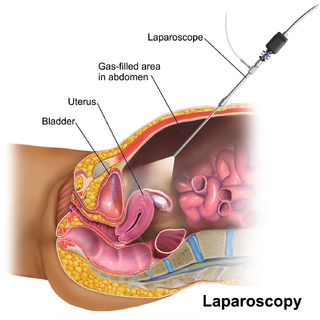
Laparoscopy is an operation performed in the abdomen or pelvis using small incisions with the aid of a camera. The laparoscope aids diagnosis or therapeutic interventions with a few small cuts in the abdomen.

The Colony of Virginia was a British colonial settlement in North America between 1606 and 1776.
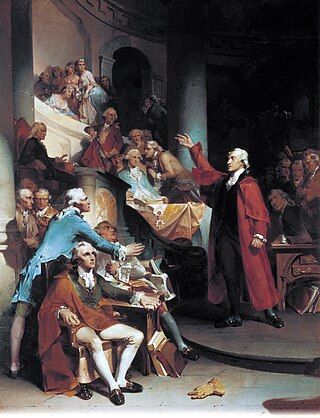
The House of Burgesses was the lower house of the Virginia General Assembly from 1619 to 1776. It existed during the colonial history of the United States when Virginia was a British colony. From 1642 to 1776, the House of Burgesses was an important feature of Virginian politics alongside the Crown-appointed colonial governor and the Virginia Governor's Council, the upper house of the General Assembly.

Hirschsprung's disease is a birth defect in which nerves are missing from parts of the intestine. The most prominent symptom is constipation. Other symptoms may include vomiting, abdominal pain, diarrhea and slow growth. Most children develop signs and symptoms shortly after birth. However, others may be diagnosed later in infancy or early childhood. About half of all children with Hirschsprung's disease are diagnosed in the first year of life. Complications may include enterocolitis, megacolon, bowel obstruction and intestinal perforation.

Colorectal surgery is a field in medicine dealing with disorders of the rectum, anus, and colon. The field is also known as proctology, but this term is now used infrequently within medicine and is most often employed to identify practices relating to the anus and rectum in particular. The word proctology is derived from the Greek words πρωκτός proktos, meaning "anus" or "hindparts", and -λογία -logia, meaning "science" or "study".
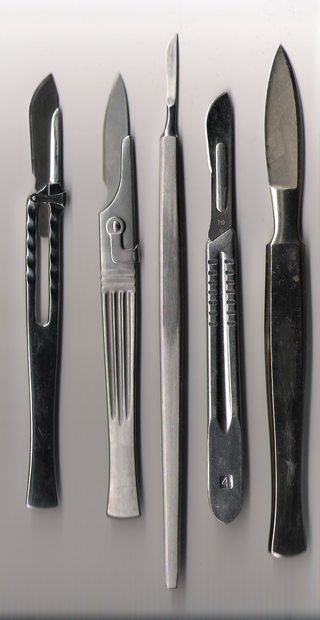
A surgical instrument is a medical device for performing specific actions or carrying out desired effects during a surgery or operation, such as modifying biological tissue, or to provide access for viewing it. Over time, many different kinds of surgical instruments and tools have been invented. Some surgical instruments are designed for general use in all sorts of surgeries, while others are designed for only certain specialties or specific procedures.

Belting is the use of belts made of strong materials as a whip-like instrument for corporal punishment. Although also used in educational institutions as a disciplinary measure, it has most often been applied domestically by parents. This practice has now been abolished by most schools, at least in the Western world, as it is seen by many as an abusive and excessive punishment.

A volvulus is when a loop of intestine twists around itself and the mesentery that supports it, resulting in a bowel obstruction. Symptoms include abdominal pain, abdominal bloating, vomiting, constipation, and bloody stool. Onset of symptoms may be rapid or more gradual. The mesentery may become so tightly twisted that blood flow to part of the intestine is cut off, resulting in ischemic bowel. In this situation there may be fever or significant pain when the abdomen is touched.
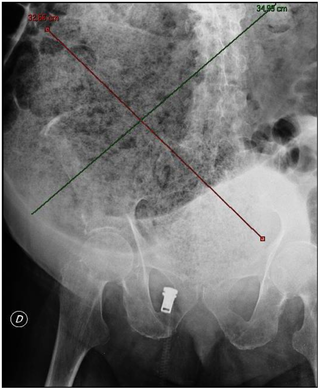
A fecal impaction or an impacted bowel is a solid, immobile bulk of feces that can develop in the rectum as a result of chronic constipation. Fecal impaction is a common result of neurogenic bowel dysfunction and causes immense discomfort and pain. Its treatment includes laxatives, enemas, and pulsed irrigation evacuation (PIE) as well as digital removal. It is not a condition that resolves without direct treatment.
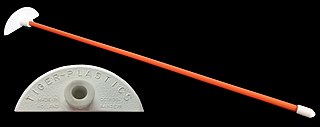
The bottle scraper is a Dutch kitchen tool similar to a small spatula. It is designed to scrape the contents of long bottles that would be impossible to reach with other kitchen tools. Although the tool is sold in Norway and has even been described in some accounts as having originated there, it was introduced in the Netherlands around 1954 by a Dutch family-owned company Tijger Plastics NV founded in 1950 and nowadays operating as Coram NV. The bottle scraper was patented on 31 March 1967 and it is cited as a quintessentially Dutch tool as well as an example of Dutch thrift.
The spurtle is a wooden Scottish kitchen tool, dating from the 15th century, that is used to stir porridge, soups, stews, and broths.
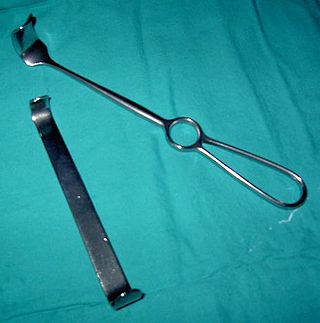
A retractor is a surgical instrument used to separate the edges of a surgical incision/wound or to hold away certain organs and tissues so that body parts underneath may be accessed during surgical operations.

Sir Francis Wyatt (1588–1644) was an English nobleman, knight, politician, and government official. He was the first English royal governor of Virginia. He sailed for America on 1 August 1621 on board the George. He became governor shortly after his arrival in October, taking with him the first written constitution for an English colony. Also sailing with him on this voyage was his second cousin Henry Fleete Sr., who helped found colonies in both Virginia and Maryland. In 1622 he rallied the defence of Jamestown which was attacked by Native Americans, during which the lives of some 400 settlers were lost and he then oversaw the contraction of the colony from scattered outposts into a defensive core.

Dental instruments are tools that dental professionals use to provide dental treatment. They include tools to examine, manipulate, treat, restore, and remove teeth and surrounding oral structures.
Stercoral ulcer is an ulcer of the colon due to pressure and irritation resulting from severe, prolonged constipation due to a large bowel obstruction, damage to the autonomic nervous system, or stercoral colitis. It is most commonly located in the sigmoid colon and rectum. Prolonged constipation leads to production of fecaliths, leading to possible progression into a fecaloma. These hard lumps irritate the rectum and lead to the formation of these ulcers. It results in fresh bleeding per rectum. These ulcers may be seen on imaging, such as a CT scan but are more commonly identified using endoscopy, usually a colonoscopy. Treatment modalities can include both surgical and non-surgical techniques.

Liquid paraffin, also known as paraffinum liquidum, paraffin oil, liquid paraffin oil or Russian mineral oil, is a very highly refined mineral oil used in cosmetics and medicine. Cosmetic or medicinal liquid paraffin should not be confused with the paraffin used as a fuel. The generic sense of paraffin meaning alkane led to regional differences for the meanings of both paraffin and paraffin oil. It is a transparent, colorless, nearly odorless, and oily liquid that is composed of saturated hydrocarbons derived from petroleum.

A kitchen scraper is a kitchen implement made of metal, plastics, wood, rubber or silicone rubber. In practice, one type of scraper is often interchanged with another or with a spatula for some of the various uses.
A retained surgical instrument is any item inadvertently left behind in a patient’s body in the course of surgery. There are few books about it and it is thought to be underreported. As a preventable medical error, it occurs more frequently than "wrong site" surgery. The consequences of retained surgical tools include injury, repeated surgery, excess monetary cost, loss of hospital credibility and in some cases the death of the patient.

During a 104-year period from 1626 to 1730, there are documented Virginia Witch Trials, hearings and prosecutions of people accused of witchcraft in Colonial Virginia. More than two dozen people are documented having been accused, including two men. Virginia was the first colony to have a formal accusation of witchcraft in 1626, and the first formal witch trial in 1641.

Goodwife Joan Wright, sometimes "Jane Wright" and called ''Surry's Witch," is the first person known to have been legally accused of witchcraft in any British North American colony.
















